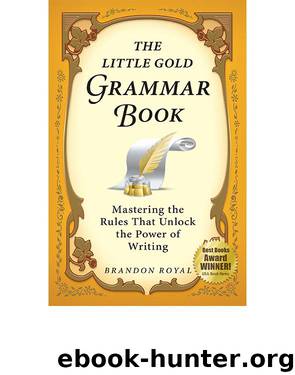The Little Gold Grammar Book by Brandon Royal

Author:Brandon Royal
Language: eng
Format: epub
ISBN: 9781897393321
Publisher: Maven Publishing
Published: 2010-09-01T04:00:00+00:00
ANSWERS AND EXPLANATIONS
1. Vacation
Choice D
Classification: Subject-Verb Agreement
Skill Rating: Easy
Snapshot: This problem is included to highlight the handling of correlative conjunctions, namely “either/or” and “neither/nor,” which may involve the use of a singular or plural verb.
The consistent appearance of “neither” (in answer choices A through E) indicates a “neither … nor” relationship. We can eliminate choices A and B outright. The correct verb should match the noun that comes after the word “nor.” Since “her sisters” in D is plural, the plural verb “are” does the trick.
In summary, singular subjects following “or” or “nor” always take a singular verb; plural subjects following “or” or “nor” take a plural verb. Stated another way, when two items are connected by “or” or “nor,” the verb agrees with the closer subject. That is, the verb needs only to agree with the subject that comes after “or” or “nor.”
There are two potentially correct answers:
Neither Martha nor her sisters are going on vacation.
or
Neither her sisters nor Martha is going on vacation.
Note that only the first alternative above is presented by answer choice D.
Back to problem
2. Leader
Choice A
Classification: Subject-Verb Agreement
Skill Rating: Easy
Snapshot: This problem is included to show subject-verb agreement and to highlight the role of prepositional phrases in disguising the subject and verb.
The subject of a sentence determines the verb (i.e., singular subjects take singular verbs; plural subjects take plural verbs) and the subject of this sentence is “activities” (plural). The intervening phrase “of our current leader” is a prepositional phrase, and prepositional phrases can never contain the subject of a sentence. Mentally cut out this phrase. Since the subject is “activities,” the verb is “have,” not “has.” Another distinction that needs to be drawn relates to the difference between “number” and “amount.” The word “number” is used for countable items and “amount” for non-countable items. Therefore, we have no problem choosing choice A as the correct answer after applying only two rules — the first is a subject-verb agreement rule followed by the “number” versus “amount” diction distinction. Also, per choices B and D, the clause “has/have been significant in the increase” is not only awkward but also passive.
Back to problem
3. Marsupial
Choice D
Classification: Subject-Verb Agreement
Skill Rating: Medium
Snapshot: This follow-up problem is also included to highlight the role of prepositional phrases within subject-verb agreement.
The subject of the sentence is “pattern,” which is singular, and a singular subject takes the singular verb “indicates.” An additional way to eliminate choices A and B is through the redundant use of the words “might” and “possibility” which express the same idea; either “possibility” or “might” is required. Also, the use of “might” in choice D is better than “may” (choice E) because “might” more clearly indicates “possibility” than does “may.” "Might" is also the correct choice when referring to past events. In choosing between choices D and E, the idiom “descendant of” is superior to the unidiomatic “descendant from.
Download
This site does not store any files on its server. We only index and link to content provided by other sites. Please contact the content providers to delete copyright contents if any and email us, we'll remove relevant links or contents immediately.
The Art of Coaching Workbook by Elena Aguilar(51148)
Trainspotting by Irvine Welsh(21624)
Twilight of the Idols With the Antichrist and Ecce Homo by Friedrich Nietzsche(18611)
Fangirl by Rainbow Rowell(9220)
Periodization Training for Sports by Tudor Bompa(8241)
Change Your Questions, Change Your Life by Marilee Adams(7725)
This Is How You Lose Her by Junot Diaz(6866)
Asking the Right Questions: A Guide to Critical Thinking by M. Neil Browne & Stuart M. Keeley(5747)
Grit by Angela Duckworth(5589)
Red Sparrow by Jason Matthews(5460)
Paper Towns by Green John(5168)
Room 212 by Kate Stewart(5095)
Ken Follett - World without end by Ken Follett(4712)
Housekeeping by Marilynne Robinson(4429)
The Sports Rules Book by Human Kinetics(4374)
Double Down (Diary of a Wimpy Kid Book 11) by Jeff Kinney(4257)
Papillon (English) by Henri Charrière(4247)
The Motorcycle Diaries by Ernesto Che Guevara(4078)
Exercise Technique Manual for Resistance Training by National Strength & Conditioning Association(4052)
